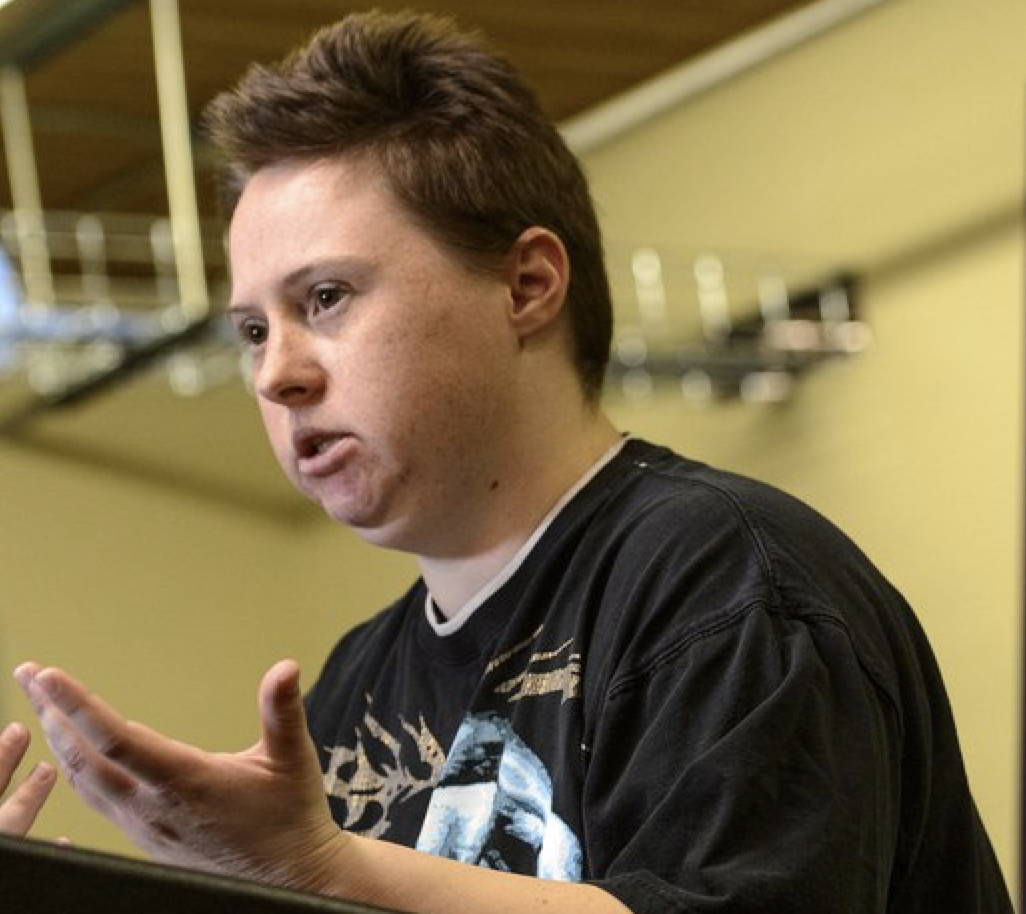No Way Out: Class Action Seeks Integration of People with Disabilities in Utah
Nate Crippes, Staff Attorney - Disability Law Center, UT.
Over the last 4 years, staff from the Disability Law Center of Utah (DLC) have, under their federal authority, visited individuals with intellectual and developmental disabilities (ID/DD) living in private institutions, called intermediate care facilities (ICFs). The message was clear: People desperately wanted out.
In Utah, there are roughly 650 individuals with ID/DD residing in ICFs, living segregated from their larger communities. ICF residents, the plaintiffs in this lawsuit, have little to no privacy, often living in crowded facilities where 2-4 adults are packed into small rooms. Their schedules are highly regimented, not even getting to decide when or what to eat. Further, they have very little interaction with their non-disabled peers.
Staci yearns for freedom and an independent life
Two of these individuals, our named plaintiffs Staci and John, have both expressed a desire to have a romantic relationship, but were told they could not by their ICF. Staci wants to go to college and the confidence that comes with living an independent life. John just wants the ability to control the schedule of his own day, simply deciding when he might go to the nearest Apple Store.
People like Staci and John, essentially have two options:
· They can receive community-based services provided in their own residence, or in a small group home supported with staff, but if they want to receive services like this, they usually have to wait for many years on a list of interested individuals that the State keeps.
· If the need for services is more immediate, as was the case for Staci and John, the State has to provide those services in an ICF. Individuals residing in ICFs are provided no meaningful access to community-based services. The State has essentially walled them off from the waiting list for community-based services, instead creating a program called Transition that is the only way out of an ICF.
Unfortunately, the Transition Program is incredibly flawed. Transition does not receive dedicated funding, and the State has only managed to move out an average of under 8 individuals per year over the last decade. In addition, the State provides little information about the program to residents, and what little information is provided is unclear. Many residents do not know about Transition, their only way out.
Moreover, the Program is essentially a lottery. In certain years, individuals must apply, while all residents are included in others. In either scenario, the State randomly selects individuals to move out. Due to a lack of clear information, individuals often don’t apply when they want out, or they turn down an opportunity even when they win the lottery. This system leaves Staci and John trapped in a life of segregation that they cannot escape.
That is why the DLC, along with the law firm Parsons Behle & Latimer, recently filed a class action lawsuit against the State for their unnecessary and unlawful segregation of individuals in private ICFs. In the landmark U.S. Supreme Court decision Olmstead v. L.C., the Court made clear that the unnecessary segregation, isolation, and institutionalization of people with disabilities is discrimination under the Americans with Disabilities Act (ADA). We expect the state to meet its obligations under federal law to those like Staci and John.
People with disabilities have the right to lead fully integrated lives and not to be isolated from the community. Staci and John should get to experience the pleasure of going on a date, eating what and when they choose, and making many of the daily decisions that we take for granted. The same applies to all individuals unnecessarily segregated in institutions in Utah.
Media abut the case:
Salt Lake Tribune, 'Can you help me get out of here?' - Utah sued over 'inadequate' system of care for developmentally disabled adults
KMYU, Lawsuit against state of Utah alleges violation of American Disabilities Act
Deseret News, Lawsuit accuses Utah agencies of segregating, isolating disabled adults in care facilities
Salt Lake Tribune, This intellectually disabled Utah woman wants to date, work more and go to college. But the state makes it impossible to leave her 'crowded, noisy and isolated' institution, lawyers say.
Jamrock, Intellectually disabled Utah woman yearns for freedom from her institutionalized lifestyle
Fox13, Disability Law Center files lawsuit against Utah departments and services
Standard-Examiner, Lawsuit seeks expanded freedoms for Utah's intellectually disabled adults
Salt Lake Tribune, Editorial: Let's take better care of our individuals with disabilities
Deseret News, In our opinion: Disabled Utahns deserve compassionate care and better housing options




